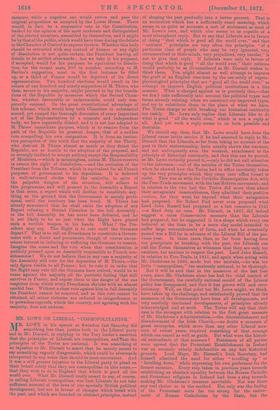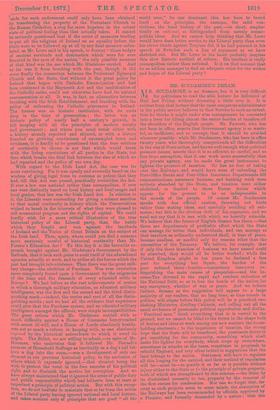MR. LOWE ON LIBERAL "COSMOPOLITANISM."
MR. LOWE in his speech at Swindon last Saturday did something less than justice both to the Liberal party and to Mr. Disraeli, in replying to the Tory leader's assertion that the principles of Liberals are cosmopolitan, and 'that the principles of the Tories are national. It was something of an injustice to Mr. Disraeli to assert that he merely meant to say something vaguely disagreeable, which could be afterwards interpreted in any sense that should be most convenient. And it was a still greater injustice to the Liberal party to plead on their behalf solely that they are cosmopolitan in this sense,— that they wish to do in England that which is good all the world over. What Mr. Disraeli really meant to say, of course, in calling Liberals cosmopolitan, was that Liberals do not take sufficient account of the laws of our specially British political development, but are in favour of changes which break with the past, and which are founded on abstract principles, instead
of shaping the past gradually into a better present. That is an accusation which has a sufficiently exact meaning, which seems to us quite as accurate a sort of statement as moat of Mr. Lowe's own, and which also seems to us capable of a most triumphant reply. But to say that Liberals are in favour of doing " that which is good all the world over," and that " national " principles are very often the principles " of a particular class of people who may be very ignorant, very circumscribed in their minds, very prejudiced, very insular," is not to give that reply. If Liberals were only in favour of doing that which is good " all the world over," their reforms would probably be as ill-considered as Mr. Disraeli wishes to think them. You might almost as well attempt to improve the graft of an English rose-tree by the use solely of vegeto- physiological principles that are " good all the world over," as attempt to improve English political institutions in a like manner. What is charged against us is precisely this,—that we don't take sufficiently into account the political types and forms already existing, when we construct our improved types, and try to substitute them in the place of what we have. The Tories charge us with breaking our historical continuity too rashly. Mr. Lowe only replies that Liberals like to do what is good " all the world over," which is not a reply at all. And yet such a reply seems to us both possible and desirable.
We should say, then, that Mr. Lowe would have done the Liberal cause better service if he had asserted in reply to Mr. Disraeli that the Liberals, so far from taking no account of the past in their statesmanship, have usually shown the warmest, and not unfrequently even the weakest, attachment to the principle of historical continuity, and that this can be proved, as Mr. Lowe virtually proved it,—only he did not call attention to the inference,—out of the mouths of the Tories themselves, when he showed how the Tories had in office inevitably taken up the very principles which they came into office bound to resist. This was so with the Catholic Emancipation Act, with the Free-Trade movement, with the last Reform movement ; and in relation to the two last the Tories did more than admit their antagonists' reasonableness, they admitted their positive caution, for they went far beyond what their antagonists had proposed. Sir Robert Peel never even proposed what Lord John Russell had proposed as a last resource in 1841 —a fixed duty on corn. Mr. Disraeli, in 1867, did indeed suggest a more Conservative measure than the Liberals had prepared, but he suggested it in a shape which every one believed at the time to be a mere clay model intended to suffer large retrenchments of form, and what he eventually passed was a Bill far in advance of the Liberal Bill of the pre- vious year. In these cases, then, so far from having been too precipitate in breaking with the past, the Liberals can call the Tories themselves as witnesses that they are only too cautious, too anxious to respect the past. Lord John Russell, in relation to Free Trade, in 1841, and again when acting with Mr. Gladstone in 1866, made but one mistake,—he was too little " cosmopolitan," too anxiously national, to be thorough.
But it will be said that in the measures of the last four years, since Mr. Gladstone alone has had the chief control of the Government, the carefully national mould of the Liberal policy has disappeared, and that it has grown wild and revo- lutionary. Well, on that point too Mr. Lowe might, we think, have taken up the challenge, and satisfactorily proved that the measures of the Government have been all developments, and very carefully continued developments, of principles already acknowledged and at work. The Tories will say that their case is the strongest with relation to the first great measure of Mr. Gladstone's Administration,—the disestablishment and disendowment of the Irish Church,—no doubt a measure of great enterprise, which more than any other Liberal mea- sure of recent years, required something of that courage which can cancel as well as guide. But what were the histori- cal antecedents of that measure I Statesmen of all parties were agreed that the Protestant Establishment in Ireland was an anomaly utterly indefensible on any but historical grounds. Lord Mayo, Mr. Disraeli's Irish Secretary, had himself admitted the need for either " levelling up " or "levelling down," while expressing his own preference for the former measure. Every step taken in previous years towards establishing an absolaib equality between the Roman Catholic and Protestant religions in Ireland had been a step towards making Mr. Gladstone's measure inevitable. Nor was there any real choice as to the method. Not only was the feeling of the Protestant sects far too strong for the endow- ment of Roman Catholicism by the State, but the funds for such endowment could only have been obtained by transferring the property of the Protestant Church to the Roman Catholics, a step far more hopeless in the actual state of political feeling than that actually taken. It cannot be seriously questioned that if the series of measures tending to put all the religions of Ireland on an equality before the State were to be followed up at all by any final measure calcu- lated, as Mr. Lowe said in his speech, to destroy " those badges of ancient servitude and domination which were for ever flaunted in the eyes of the nation," the only possible measure of that kind was the one which Mr. Gladstone carried. And so far was it from breaking with the past, though it did sever finally the connection between the Protestant Episcopal Church and the State, that without it the great policy for Ireland that began with Catholic Emancipation and had been continued in the Maynooth Act and the modification of the Catholic oaths, could not otherwise have had its natural consummation at all. It was, in fact, an alternative between breaking with the Irish Establishment, and breaking with the policy of redressing the Catholic grievances in Ireland. The former was an historic institution, with its roots deep in the time of persecution ; the latter was an historic policy of nearly half a century's growth, in full keeping with all the principles of modern society and government ; and where you must break either with a history already repented and abjured, or with a history founded on growing convictions of unexampled force and vividness, it is hardly to be questioned that the true solution of continuity to choose is not that which would break with the living convictions of all parties in the State, but that which breaks the final link between the sins of which we had repented and the policy of our own day.
With regard to the Irish Land Act, the case was far more convincing. For it was openly and avowedly based on the wisdom of giving legal force to customs so potent that they had, till this Act was passed, practically overridden the law. If ever a law was national rather than cosmopolitan, if ever one were distinctly based on local history and local usages and local genius, that law was the Irish Land Act. In relation to it, the Liberals were contending for giving a solemn sanction to that moral continuity in history which the Conservatives wished to break in the interests of what they were pleased to call economical progress and the rights of capital. We could hardly wish for a more critical illustration of the true historical policy of the Liberal party, than the battle which they fought and won against the landlords of Ireland and the 'Tories of Great Britain on the subject of the Irish land. Then, again, where could you find a measure more anxiously careful of historical continuity than Mr. Forster's Education Act ? To this day it is the favourite re- proach brought against Mr. Gladstone's Government by the Radicals, that it took such pains to avail itself of the educational agencies actually at work, and to utilise all the forces which the past had brought into existence. Then there was the great mili- tary change—the abolition of Purchase. Was ever revolution more completely forced upon a Government by the exigencies of the time and the demands of every educated critic in Europe V We had before us the vast achievements of armies in which a thorough military education, an educated military intelligence, was the first and the second and the third distin- guishing mark,—indeed, the centre and root of all the distin- guishing marks ; and we had all the evidence that experience could give that the Purchase system, and an educated military intelligence amongst the officers, were simple incompatibilities. The great reform which Mr. Gladstone carried with so much difficulty against a House of Commons honeycombed
with secret and a House of Lords absolutely hostile, was not so much a reform in keeping with, as one absolutely imposed by the historical antecedents to which it owed its origin. The Ballot, we are willing to admit,—in spite of Mr. Horsman, who maintains that it followed Mr. Disraeli's measure of Household Suffrage as inevitably as a dog's tail fol- lows a dog into the room,—was a development of only one element in our previous historical policy, to the exclusion of others which it expressly ignored,—that elemOnt being the wish to protect the voter in the free exercise of his political right, and to diminish the motive for corruption. And we have always maintained that it ignored the sense of public duty and public responsibility which had hitherto been at least as important a principle of political action. But with this excep- tion, we do not hesitate to maintain that so far from the action of the Liberal party having ignored national and local history, and taken account only of principles that are good " all the
world over," its one dominant idea has been to found itself on the principles, the customs, the solid con- victions, the local history of the past,—in short, empha- tically on national, as distinguished from merely cosmo- politan ideas. And we cannot help thinking that Mr. Lowe would have done better service to the Liberal party than even his clever tirade against Toryism did, if he had pursued in his speech at Swindon such a line of argument as we have sketched out. But Mr. Lowe in his heart probably despises this slow historic method of reform. His intellect is really cosmopolitan rather than national. Is it on that account that he so seldom manages to find an adequate voice for the wishes and hopes of the Liberal party







































 Previous page
Previous page